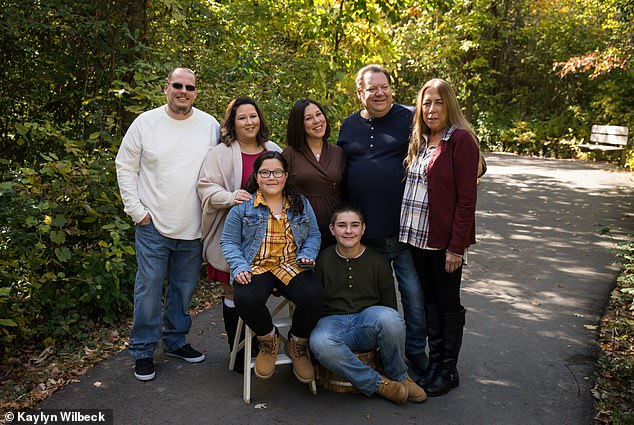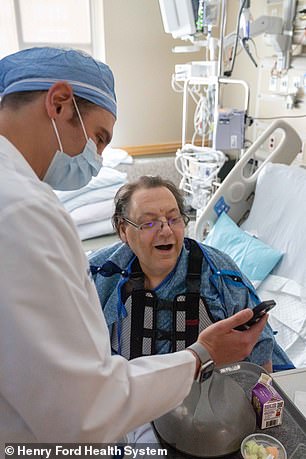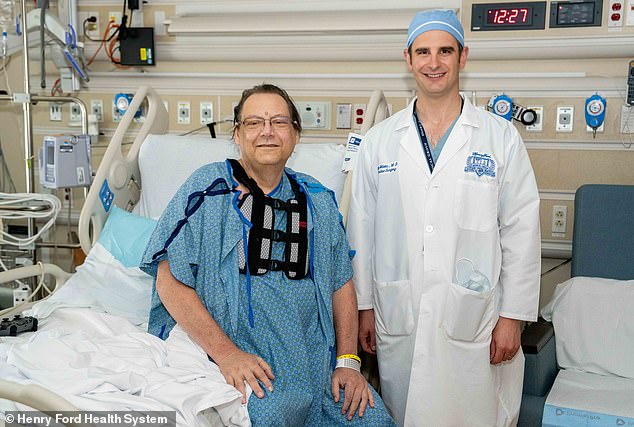A man in Michigan became the first in the state to receive a “miraculous” new heart that was transplanted while it was still beating.
Ken Miller, 58, has spent more than a decade battling heart failure after suffering a heart attack in 2013.
The event forced him to retire from his 30-year job in the dairy industry, and doctors told him there was little they could do until he received a new heart.
Over the next few years, Mr. Miller’s heart was so damaged that it grew to twice its normal size and he also suffered kidney failure.
But on his 58th birthday, father and grandfather he learned he would be receiving a new heart and kidney, which he said gave him “a new lease on life.”
“I think it’s just a miracle,” he said.
Ken Miller, 58, became the first patient in Michigan to receive a beating heart transplant (pictured with lead surgeon Dr. Kyle Miletic).

Miller, a father and grandfather, suffered from heart failure for more than a decade after suffering a heart attack. He also received a new kidney.
Miller is one of just 70 Americans who have received a beating heart transplant, an intervention intended to resolve the demand of more than 3,500 people in the United States waiting for a heart transplant.
Typically, during a heart transplant, the organ is stopped, removed from the deceased donor, and transported on ice to the hospital.
However, these organs can only remain viable in ice for about four hours, meaning they can only travel so far to reach the recipient.
This limits the number of organs available to people who need them.
But a “heart in a box,” which stays pumping during transport, remains viable for longer periods of time, allowing it to be transported further and accessible to more patients.
Dr. Kyle Miletic, a cardiac and transplant surgeon at Henry Ford Hospital in Detroit, who led the procedure. saying in a press release: ‘The heart in a box is like a mini heart and lung machine that we use for traditional open heart surgery. The surgeons stop the heart at the donor hospital and put it in this machine.’
“The machine restarts the heart and provides it with all the blood and nutrients it needs to stay healthy, so that while traveling to Henry Ford Hospital, the heart never loses its blood supply and never stops beating until you remove it from the device “.
The heart stopped only once, when it was first removed from the donor, and was placed still beating in Mr. Miller’s chest.
Stopping the heart just once can reduce recovery time as well as the risk of future complications.
“Although this was more difficult than operating with a stopped and still heart, the heart was much stronger and more robust than we normally see with the traditional method,” Dr. Miletic said.
He added: “Stopping the heart a second time weakens it, which increases the chances of needing mechanical support… after the transplant, which can lead to longer recovery times for the patient.”
“But if the heart only has to stop once, the muscle remains stronger and the outcomes for the patient are better.”
Following the procedure in May, Mr Miller did not require any additional medical support and he (and his new heart) are recovering well.


Miller is one of 70 Americans who have received this pioneering operation. He said he now looks forward to doing small activities like walking his dog, Chip (right).

‘I knew that one day I would need a new heart. “I never dreamed it would be so special,” said Mr. Miller, pictured here with his late wife, Liz.
It is unclear how long the procedure took, but a traditional heart transplant takes approximately six to 12 hours.
Because Mr. Miller’s original heart had grown so large, Dr. Miletic said the team had more room to operate, which reduced the risk of complications.
“It’s more complicated because you’re sewing moving tissue, but this patient was uniquely suited for this transplant method,” Dr. Miletic said.
He added: “This was also his first surgery. When patients have previously undergone open heart surgery, subsequent operations can be complicated due to the presence of scar tissue.
“In this case, the conditions were almost perfect for us.”
The team said Miller’s new organ traveled several hundred miles.
The first beating heart transplant was performed last March by a team at Stanford University, which they called “revolutionary.”
Mr Miller now looks forward to enjoying the little things he has missed, like climbing stairs and walking his dog.
He said: “I live comfortably with my rescue dog, Chip, and I’m excited to come home, relax and get back to normal – seeing my kids and grandkids, sitting down and playing my guitar again.”
‘I am very grateful to these doctors for being able to say that. I knew that one day I would need a new heart. “I never dreamed it would be so special.”


